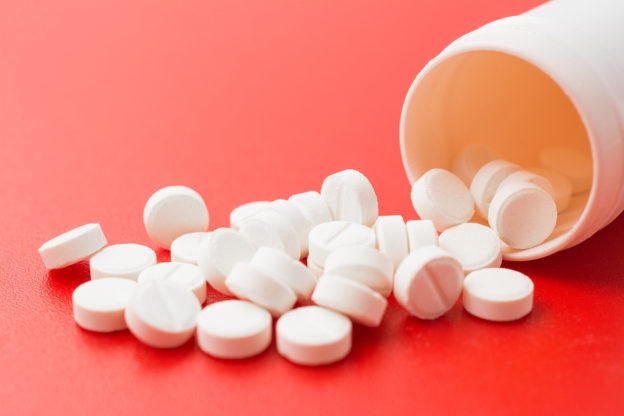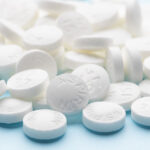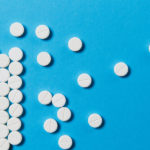By David Blyweiss, M.D., Advanced Natural Wellness
April 12, 2019
For decades I’ve warned my patients and readers against the use of low-dose aspirin for the prevention of cardiovascular disease. And today, the American College or Cardiology and the American Heart Association are closer than ever to agreeing with me.
Just last month they just released their latest guidelines on the prevention of cardiovascular disease. And I am happy to see their latest stance on low-dose aspirin is much more in alignment with my own.
In their own words, “Aspirin should be used infrequently in the routine primary prevention of atherosclerotic cardiovascular disease because of lack of net benefit”. They also admit that the bleeding risks associated with aspirin may outweigh the benefits.
This has been long in the coming. In the meantime, a lot of damage has been done.
At last count, nearly 50 million adults over the age of 40 regularly take low-dose aspirin for heart protection. Some of them have heart disease, some don’t. Some of them aren’t even at risk for it. In a large number of cases, their doctors never advised them to take it in the first place.
And among patients who actually do have a cardiovascular disease diagnosis, about 70% take low-dose aspirin on a daily basis.
These statistics are mind-bending!
MD Exposes the Hidden Danger to Your Eyes

When your eyesight starts to fail, it's a real problem. Suddenly you can't go to the grocery store... you can't get to the doctor if you have an emergency... you can't meet your friends for dinner…
Your "regular" doctor doesn't have time to keep up with the latest research. And the same goes for eye doctors. They go to school to learn how to fit you for glasses and contacts, but have no way of preventing the damage and loss of eyesight that threatens your freedom and independence.
Let me show you something that explains a LOT about how your eyes work.
In my FREE Special Report, I'll show you a HUGE, untapped resource for your eyes that safely and naturally restores clear, effortless eyesight.
Click here to get started...
And I have the feeling that all the millions of people taking a daily aspirin are going to have a hard time giving up their misplaced faith in these little white pills.
Still, there are multiple reasons to get low-dose aspirin out of your life for good.
In recent years we’ve discovered that the potential protective benefits are questionable at best. Yet, the risk of ulcers, gastrointestinal bleeding and intracranial hemorrhage go up considerably. (In many cases, these bleeds are so awful that patients require blood transfusions.)
Believe me, it’s not a good trade-off.
Plus, a large number of people are placed on dual therapies. This is when a patient is advised to use aspirin as an adjunct to their regular blood thinner.
And what a disaster that can be!
It’s estimated that nearly 40% of people taking this combination have no clear indication or reason for it! This immediately places all of these patients at risk of serious bleeds – or worse, hemorrhagic stroke.
The Sensible Approach to Naturally Thin Blood
In almost all cases, the foods you eat and the amount of physical activity you participate in both have a profound effect on your blood viscosity.
For example, inactivity causes your blood to become more sluggish. This is why people on long flights sometimes develop blood clots. (Always get up and walk the aisles on long flights!)
In other words, it doesn’t take long for your blood to thicken up. If you’re sedentary, get up and get moving. If you’re confined to bed due to illness, make sure you practice safe bed exercises recommended by your physician or therapist.
As far as foods are concerned, fresh, natural, nitrate-rich foods help your body produce a gas called nitric oxide.
Are You Suffering From...
- Love handles and a pot belly
- Romance that isn't what it used to
- Forgetfulness and inattention
- Low (or no) strength and endurance
- A sex drive that's shifted into neutral...or worse
If so...you may have Mature Male Burnout. Click here to discover more about this unique condition and what you can do about it.
This compound “invigorates” your blood vessels and helps keep your blood platelets from clumping together. It also lowers your blood pressure and protects the delicate inner lining endothelium of your blood vessels.
Some high nitrate foods include beetroot, leafy greens, melon, celery and lettuce. Chinese cabbage, radishes and turnips are good sources, too.
However, the quickest and most effective way to produce more of this compound is with a nitric oxide enhancer. Look for a plant-based formula that has beetroot juice as its main ingredient. These formulas vary from one manufacturer to another, so make sure to choose the one that gives you the biggest bang.
I also like garlic. It’s one of the most heart- and artery-friendly foods you can eat. Not only does it keep your blood cells from sticking together. It also helps to prevent oxidation of LDL cholesterol, lowers blood pressure and protects against free radical damage.
I advise my patients to eat two cloves of fresh garlic a day. Throw them into a smoothie or eat them with olives. (If the smell puts you off, I recommend supplementing with 600 mg of aged garlic extract twice each day.)
Fish is another big winner when it comes to your cardiovascular health. The omega-3 fatty acids help prevent blood platelets from sticking together – but without the risk of increased bleeding!
Always choose wild-caught fish that is low on the food chain, such as mackerel, salmon, herring and trout. It’s also a good idea to supplement with a premium mercury-free fish oil supplement. Take between 2,000 and 4,000 mg daily. If you’re trending towards a whole food plant based diet for any reason, there are plant based Omega-3 supplements widely available.
Ginger is another heart-healthy food. It contains compounds that have even more anti-platelet activity than aspirin does. So it works extremely well as a blood thinner in patients with heart disease and diabetes.
I personally like to buy fresh ginger root. But you can also find it in jars. It comes pickled, unpickled, sliced and minced. Or, if you prefer, there is nothing wrong with using a ginger supplement.
Keep in mind that all of these foods and/or supplements naturally maximize blood flow. So it’s important that you avoid these foods (or their supplement versions) if you’re already taking a blood thinner like Coumadin, Heparin, Pradaxa, Xarelto, Eliquis… or whatever new blood-thinning drug pops up on the market.
SOURCES:
2019 ACC/AHA Guideline on the Primary Prevention of Cardiovascular Disease. Mar 2019.
ACC/AHA Primary Prevention Guideline Provides Playbook For Managing CV Risk Factors. News Article. American College of Cardiology. Mar 2019.
Fang J, et al. Use of low-dose aspirin as secondary prevention of atherosclerotic cardiovascular disease in US adults (from the National Health Interview Survey, 2012). Am J Cardiol. 2015 Apr 1;115(7):895-900.
Stuntz Z, et al. Recent trends in the prevalence of low-dose aspirin use for primary and secondary prevention of cardiovascular disease in the United States, 2012–2015. Prev Med Rep. 2017 Mar; 5: 183–186.
Whitlock EP, et al. Bleeding Risks With Aspirin Use for Primary Prevention in Adults: A Systematic Review for the U.S. Preventive Services Task Force. Ann Intern Med. 2016 Jun 21;164(12):826-35.
García Rodríguez LA, et al. Bleeding Risk with Long-Term Low-Dose Aspirin: A Systematic Review of Observational Studies. PLoS One. 2016 Aug 4;11(8):e0160046.
Schaefer JK, et al. Association of Adding Aspirin to Warfarin Therapy Without an Apparent Indication With Bleeding and Other Adverse Events. JAMA Intern Med 2019;Mar 4:[Epub ahead of print]
Webb AJ, et al. Acute blood pressure lowering, vasoprotective, and antiplatelet properties of dietary nitrate via bioconversion to nitrite. Hypertension. 2008 Mar;51(3):784-90.
Makheja AN, et al. Antiplatelet constituents of garlic and onion. Agents Actions. 1990 Mar;29(3-4):360-3.
Begtrup KM, et al. No impact of fish oil supplements on bleeding risk: a systematic review. Dan Med J. 2017 May;64(5). pii: A5366.
Nurtjahja-Tjendraputra E, et al. Effective anti-platelet and COX-1 enzyme inhibitors from pungent constituents of ginger. Thromb Res. 2003;111(4-5):259-65.







